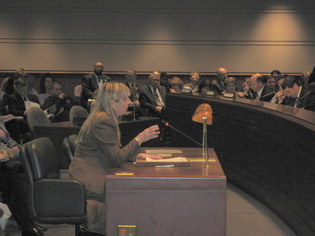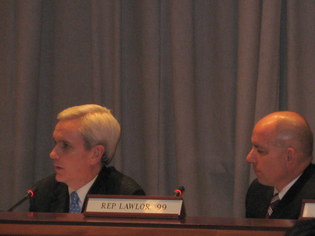
Melinda Tuhus Photo

November 28, 2007
WALKER QUESTIONS POST-PETIT PROPOSALS
by Melinda Tuhus
New Haven Independent

New Haven State Rep. Toni Walker (pictured) and Connecticut’s chief public defender spoke out amid a tide calling for locking up more people in the wake of the Petit family murders.
Chief Public Defender Susan Storey was the first person to testify Tuesday at the Judiciary Committee hearing She expressed concern that some of the legislation being proposed in the wake of the the brutal triple-murder of Cheshire’s Petit family — there are five different “three-strikes” bills, for example — “may incarcerate more people than is warranted.”
During the hearing, questions raised included: Which legislative moves will make communities safer from violent criminals? And which will serve to fill the prisons with more people, especially people of color?
Storey proposed that increasing re-entry services for inmates “may enhance public safety” — through educational programs (even college courses, she suggested), addiction services and parenting classes. There are currently long waiting lists for inmates to access such services.

Storey (pictured) said Connecticut incarcerates the fifth-highest percentage of its residents among all states. She said it locks up the highest percentage of people of color (and a much lower percentages of whites than the national average). State Sen. John Kissel took issue with some of Storey’s data, and both said they would re-check their sources.
Storey said “three strikes” data from other states indicates that such laws — which allow a sentence of life without possibility of parole for conviction on a third felony — disproportionately affect people of color. Connecticut’s prison population is 70 percent black and Latino, overwhelmingly male, while the percentage pf black and Latino men in the state is about 10 percent.
The alleged murderers of the Petit family are white. They had been out on parole when they committed the murders — leading the governor to put a temporary halt to parole. That in turn has led to protests against extended incarcerations and against overcrowded conditions in jails like New Haven’s Whalley Avenue detention center.
Some states have fine-tuned the original three-strikes law that California passed, which required life in prison on conviction for a third felony, even a non-violent crime. Storey said the data shows mixed results from states with these laws on whether they actually reduce violence.
Under persistent questioning from some members of the Judiciary Committee, Storey said she would oppose a three-strikes law in all cases, favoring instead judicial discretion.

Judiciary Committee co-chair Rep. Mike Lawlor (pictured on the right, with co-chair Sen. Andrew McDonald) asked about the roadblocks to releasing more non-violent offenders into the community, to ease prison overcrowding and also provide a more appropriate sanction to those offenders. Storey said there are a thousand people in the system (of more than 19,000 total) who’ve been approved for release but can’t find a place to stay (they’re barred from public housing, for instance) and so are still being held. She mentioned other problems they have finding jobs and adequate transportation,. “It’s very hard, once you have a record, to succeed,” she said. That led Rep. Arthur O’Neill to suggest, “You don’t think anyone should be incarcerated.” Storey assured him that was not her position.
The next official to testify was Sen. Sam Caligiuri. He’s co-sponsor of one of the three-strikes bills, which he explained could be applied only after someone’s convicted of a third violent felony. He said judges or juries would not be required to sentence such an offender to life without the possibility of parole, but would have that option. “It’s just one tool” in the criminal justice arsenal, Caligiuri explained.
He said such a law would be unlikely to greatly increase the inmate population because only 435 people have been identified who have convictions for two violent felonies and are currently out of prison. Recidivism statistics show that about 200 would commit another offense, but not all of them would be violent crimes. “I hope to God none of them” would be such offenses, he said.
New Haven Rep. Toni Walker (pictured) asked Caligiuri whether, if his bill had been law, it would have prevented the tragedy in Cheshire.
The answer is no. Both men accused, despite having multiple convictions, were considered non-violent offenders at the time they were paroled.
Walker said that FBI statistics from the state of Washington after it enacted a three-strikes law (upon which Caligiuri’s bill is based) show that violent crime was not reduced.
“I’m concerned about what you’re doing, and how we’re going about it, and what is our objective,” Walker told Caligiuri. “My objective is public safety,” she said. “And my objective is to address ways that are going to make sure that our communities — all communities, not just one or two communities — are safe. Violence is wrong. Violence needs to be addressed. But we also need to talk about guns, and also about violence — not only in the suburbs, but also in the cities.”
Connecticut already has a persistent offender law, which could be invoked to keep repeat offenders in prison. Lawlor said prosecutors tell him the law is complicated and hard to apply, and therefore little used.
One person who was waiting her turn to speak, Ramona Rivera, said her 8-year-old son Royel was killed last year by a woman driving under the influence of the drug PCP. She said the woman had robbery, larceny, assault and drug sale charges dating back to 1992, for which she’d never served a day in jail. She was arrested following her son’s death and is currently incarcerated at York Correctional Institution.
“Our state needs a habitual offender, or three-strikes law,” she wrote in her testimony, “because too many innocent people are being murdered by criminals that have and are still thumbing their noses at our criminal justice system.”
Click here for all the submitted testimony from the hearing. http://www.cga.ct.gov/asp/menu/CommDocTmy.asp?comm_code=JUD&date=11/27/2007